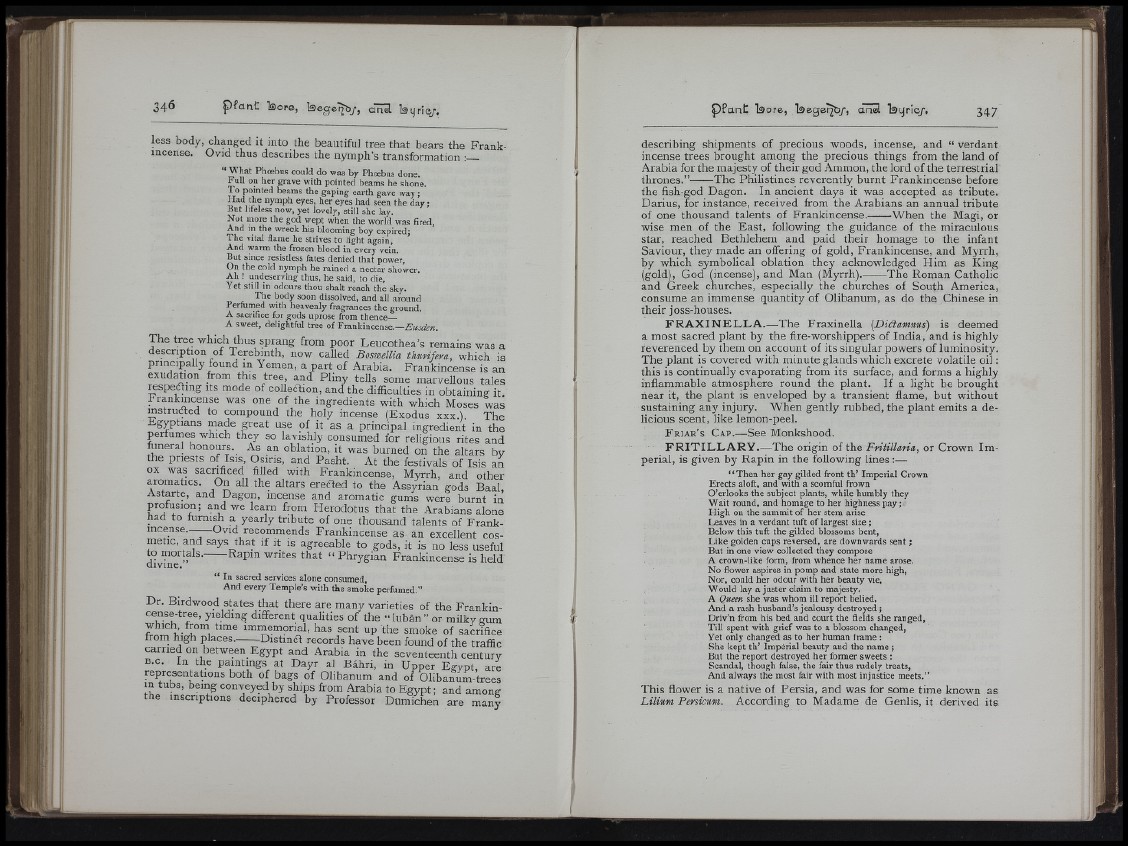
I \L
II Î/UI-l.
i !
h
i
i
p fanC Tâore, I s e g e f^ /, anel Tsijric/*,
less body, changed it into the beautiful tree that bears the Frankincense.
Ovid thus describes the nymph’s transformation ;—
“ What Phoebus could do was by Phoebus done.
Full on her grave with pointed beams he shone.
To pointed beams the gaping earth gave way;
Had the nymph eyes, her eyes had seen the da y ;
But lifeless now, yet lovely, still she lay.
Not more the god wept when the world was fired,
And in the wreck his blooming boy expired;
The vital flame he strives to light again,
And warm the frozen blood in every vein.
But since resistless fates denied that power,
On the cold nymph he rained a nectar shower.
Ah ! undeserving thus, he said, to die,
Yet still in odours thou shalt reach the sky.
The body soon dissolved, and all around
Perfumed wdth heavenly fragrances the ground.
A sacrifice for gods uprose from thence__
A sweet, delightful tree of Frankincense.—F u s d e n .
The tree which thus sprang from poor Leucothea’s remains was a
description of Terebinth, now called Boswellia thurifeva, which is
principally found in Yemen, a part of Arabia. Frankincense is an
exudation from this tree, and Pliny tells some marvellous tales
respecitmg its mode of colleaion, and the difficulties in obtaining it.
Frankincense was one of the ingredients with which Moses was
mstriKiled to compound the holy incense (Exodus xxx.). The
Egyptians made great use of it as a principal ingredient in the
perluines which they so lavishly consumed for religious rites and
iuneral honours._ As an oblation, it was burned on the altars bv
the priests of Isis Osiris, and Pasht. At the festivals of Isis an
ox was sacrificed filled with Frankincense, Myrrh, and other
aromatics. On all the altars erecited to the Assyrian gods Baal,
Astarte, and Dagon, incense and aromatic gums were burnt in
protusion; and we learn from Herodotus that the Arabians alone
had to iurnito a yearly tribute of one thousand talents of Frankincense.—
Ovid recommends Frankincense as an excellent cosmetic,
and says that if it is agreeable to gods, it is no less useful
to mortals. Rapin writes that “ Phrygian Frankincense is held
d i v i n e .
“ In sacred services alone consumed,
And every Temple’s with the smoke perfumed.”
Dr. Birdwood states that there are many varieties of the Frankin-
cense-tree, yielding different qualities of the “ luban” or milky gum
which, from time immemorial, has sent up the smoke of sacrifice
frorn high places. Distmcft records have been found of the traffic
carried on between_ Egypt and Arabia in the seventeenth century
B.C. In the paintings at Dayr al Bahri, in Upper EffvPt, are
representations both of bags of Olibanum and of Olibanum-trees
m tubs, being conveyed by ships from Arabia to E g y p t ; and among
the inscriptions deciphered by Professor Dumichen are many
describing shipments of precious woods, incense, and “ verdant
incense trees brought among the precious things from the land of
Arabia for the majesty of their god Ammon, the lord of the terrestrial
thrones.” The Philistines reverently burnt Frankincense before
the fish-god Dagon. In ancient days it was accepted as tribute.
Darius, for instance, received from the Arabians an annual tribute
of one thousand talents of Frankincense. When the Magi, or
wise men of the East, following the guidance of the miraculous
star, reached Bethlehem and paid their homage to the infant
Saviour, they made an offering of gold. Frankincense, and Myrrh,
by which symbolical oblation they acknowledged Him as King
(gold), God (incense), and Man (Myrrh). The Roman Catholic
and Greek churches, especially the churches of South America,
consume an immense quantity of Olibanum, as do the Chinese in
their joss-houses.
F R A X IN E L L A .—The Fraxinella [Didamnus) is deemed
a most sacred plant by the fire-worshippers of India, and is highly
reverenced by them on account of its singular powers of luminosity.
The plant is covered with minute glands which excrete volatile oil :
this is continually evaporating from its surface, and forms a highly
inflammable atmosphere round the plant. I f a light be brought
near it, the plant is enveloped by a transient flame, but without
sustaining any injury. When gently rubbed, the plant emits a delicious
scent, like lemon-peel.
F r ia r ’s C a p .—See Monkshood.
F R I T I L L A R Y .—The origin of the Fyitillaria, or Crown Imperial,
is given by Rapin in the following lines :—
“ Then her gay gilded front th’ Imperial Crown
Erects aloft, and with a scornful frown
O’erlooks the subject plants, while humbly they
Wait round, and homage to her highness pay;
High on the summit of her stem arise
Leaves in a verdant tuft of largest size ;
Below this tuft the gilded blossoms bent.
Like golden cups reversed, are downwards sent ;
But in one view collected they compose
A crown-like form, from whence her name arose.
No flower aspires in pomp and state more high,
Nor, could her odour with her beauty vie,
Would lay a juster claim to majesty.
A Queen she was whom ill report belied,
And a rash husband’s jealousy destroyed ;
Driv’n from his bed and court the fields she ranged,
Till spent with grief was to a blossom changed,
Yet only changed as to her human irame ;
She kept th’ Impérial beauty and the name ;
But the report destroyed her former sweets :
Scandal, though false, the fair thus rudely treats,
And always the most fair with most injustice meets.”
This flower is a native of Persia, and was for some time known as
Lilium Persicum. According to Madame de Genlis, it derived its
!i'i■ Ariti
^ i
’.i I